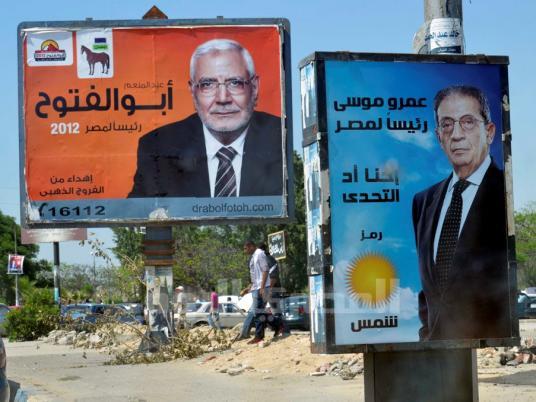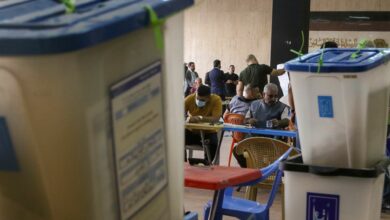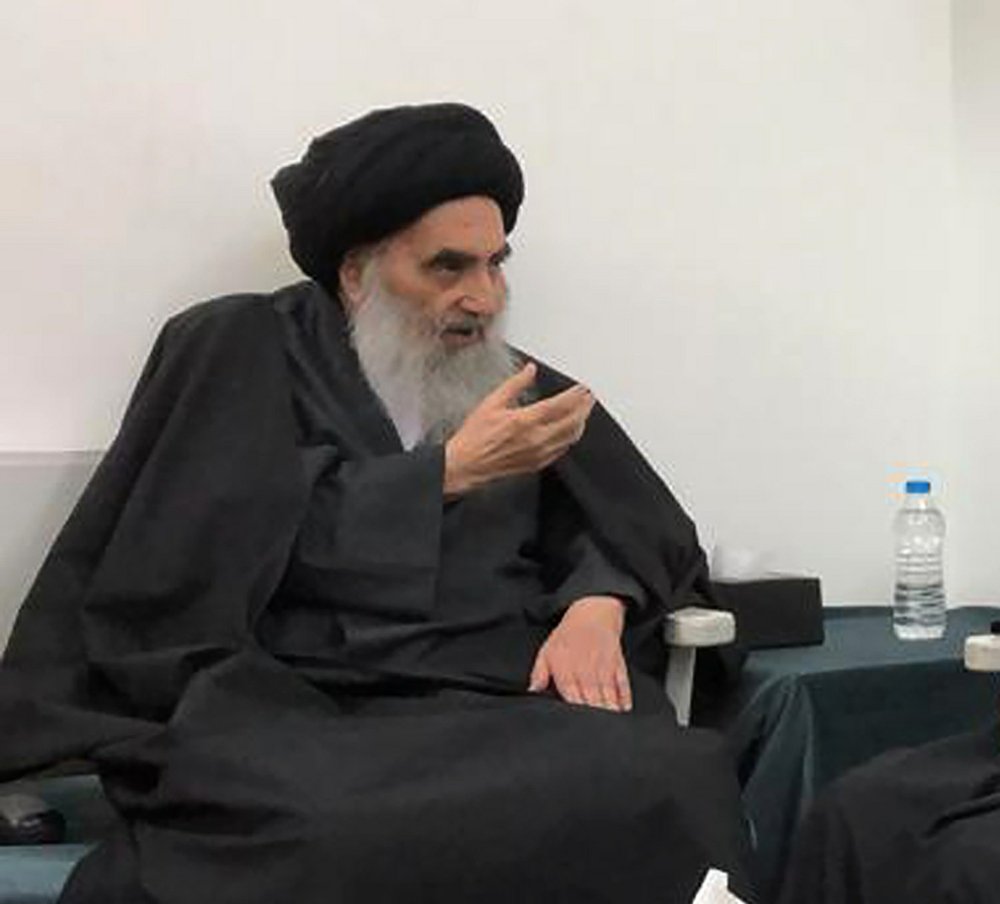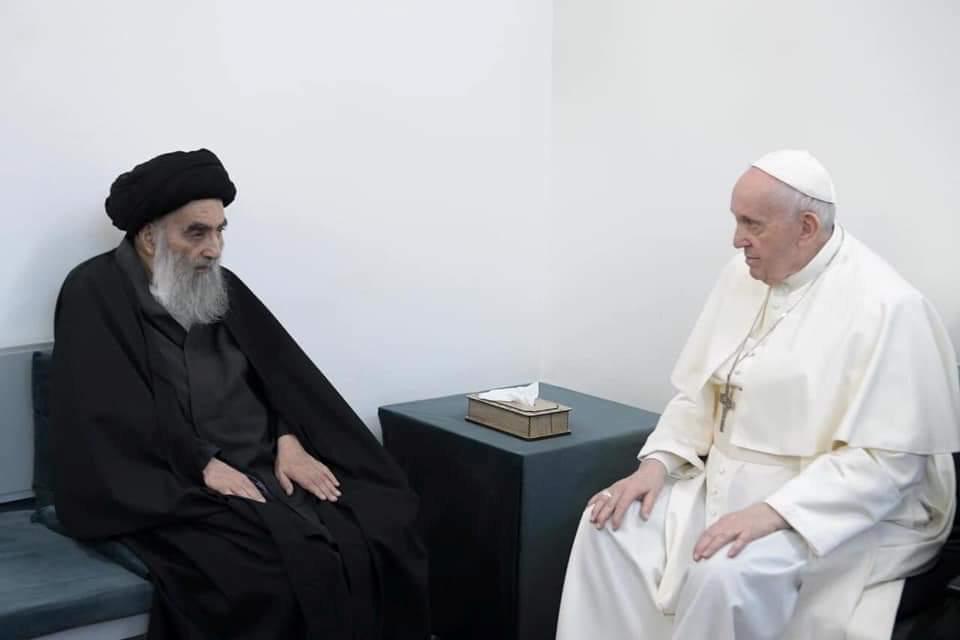
Two days are left until what many expect to be Egypt’s first democratic presidential election, and so the imposed “campaign silence” — when candidates are supposed to refrain from any kind of campaigning — begins Monday.
State-run Al-Ahram newspaper reports that for the next two days candidates are banned from placing ads or appearing in any kind of visual or audible media. They are also supposed to halt any kind of advertising in the streets, whether through posters or spoken word by the candidate or any member of his campaign.
Independent daily Al-Tahrir questions whether authorities would enforce the ban, given that campaigning started well before the set date of 20 April. Despite the fact that the public prosecutor is looking into claims about infringements by many candidates who were campaigning well before 20 April, no one has been penalized as a result. Independent MP Amr Hamzawy called for the campaign silence period to be rebuked because it is never implemented. According to Al-Tahrir, during the last parliamentary elections, political parties blatantly engaged in campaigning until the day of elections despite a similar two-day period of campaign silence theoretically being in place.
Newspapers don’t seem to be clear on exactly what would stop candidates from campaigning. State-run daily Al-Akhbar says candidates who break the ban would be fined LE100,000, while Al-Tahrir says the fine could be up to LE200,000. Al-Ahram, however, says there is no real law to stop any candidate from violating the ban. It quotes constitutional judge Maher al-Beheiry as saying that there is no direct law, but a stipulation that any violations be looked into by the public prosecutor’s office, which in turn would “act as it sees fit.”
After the campaign blackout and the election, Egypt could face yet another dilemma regarding the ill-defined role of the coming elected president. A meeting between members of the Supreme Council of the Armed Forces and some People’s Assembly MPs yesterday on the issue caused an uproar among many politicians and activists.
The military council was looking into the potential of adding clauses to the Constitutional Declaration, which would define the president’s role. Independent Al-Shorouk quotes many politicians from the liberal Wafd Party and the Muslim Brotherhood-affiliated Freedom and Justice Party, as well as others, including Mohamed ElBaradei, who think that by doing so SCAF would place itself above the state.
Prominent lawyer Tareq al-Bishry writes an opinion column in Al-Shorouk that outlines how SCAF’s proposition is not within its purview. The newspaper quotes many figures who say they think such an action could cause backlashes from political groups and in the street.
Al-Ahram paints more of a split picture regarding the additional clauses. Wasat Party leader Abul Ela Mady, Egyptian Democratic Party leader Mohamed Abul Ghar, and prominent judge Mohamed Nour Faraht said there needs to be some sort of law that regulates the relationship between individuals and the government. However, both Abul Ghar and Mady believe this should have come from a combined effort of political groups, not as an imposition by SCAF.
According to state-run Al-Akhbar, the additional clauses would include stipulations allowing the president to disband Parliament, and also to allow Parliament to submit a no-confidence vote on an existing Cabinet. Some of the paper’s sources suggest a stipulation would postpone the swearing-in of the elected president for 60 days until a new constitution is written. According to independent daily Al-Dostour, prominent political parties such as FJP and the Wafd would meet today to put together their own version of these clauses for the military council to consider. The Free Egyptians and Egyptian Democratic parties would refuse whatever Wafd and the FJP come up with, Al-Dostour says, against the principle of the FJP’s general hegemony on Egyptian politics these days.
Candidates such as former Muslim Brotherhood member Abdel Moneim Abouel Fotouh, leftist lawyer Khaled Ali, judge Hesham al-Bastawisi and Socialist Popular Alliance hopeful Abul Ezz al-Hariry have already announced their rejection of the proposition that any additional constitutional clauses would be written under SCAF supervision.
Interior Minister Mohamed Ibrahim held a press conference pointing to his ministry’s role in securing the coming elections. Ibrahim said police would secure the 9,934 voting centers in coordination with the military, which is being mobilized today to start securing the election, according to Al-Akhbar.
Al-Tahrir reports that Ibrahim also included in the press conference details of the largest sting operation to uncover a weapons-smuggling operation from Libya. Police reportedly confiscated more than 200 anti-aircraft and anti-artillery missiles in the operation.
The economic court finally issued a ruling in a very prolonged case involving the executives of one of Egypt’s telecommunications giants, Mobinil, according to Al-Dostour. The executives were accused of illegally relaying phone calls from Egypt abroad. The case became high-profile because of the insinuation that the company — led by businessman Naguib Sawiris — was using its extensive telecom abilities to bypass government regulations on international calling.
Al-Dostour and Al-Tahrir also report that the head of Al-Azhar, Ahmed al-Tayyeb, along with representatives of many other Islamic institutions, agreed yesterday to forbid Shia pilgrims from performing their rituals around some of the shrines in Egypt in fear of a “rising Shia tide.” The decision might be a prominent continuation of increasing Sunni-Shia rifts in Egypt as well as continued anti-Shia sentiment from some mainstream religious Sunni institutions in Egypt.
Egypt’s papers:
Al-Ahram: Daily, state-run, largest distribution in Egypt
Al-Akhbar: Daily, state-run, second to Al-Ahram in institutional size
Al-Gomhurriya: Daily, state-run
Rose al-Youssef: Daily, state-run
Al-Dostour: Daily, privately owned
Al-Shorouk: Daily, privately owned
Al-Watan: Daily, privately owned
Al-Wafd: Daily, published by the liberal Wafd Party
Youm7: Daily, privately owned
Al-Tahrir: Daily, privately owned
Freedom and Justice: Daily, published by the Muslim Brotherhood’s Freedom and Justice Party
Sawt al-Umma: Weekly, privately owned
Al-Arabi: Weekly, published by the Nasserist Party
Al-Nour: Official paper of the Salafi Nour Party




